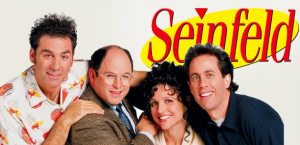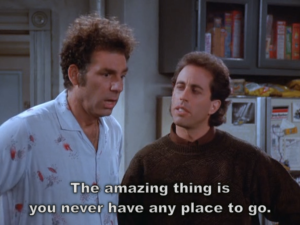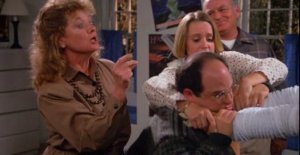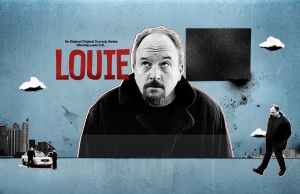
"Seinfeld" is often regarded as one of the most revolutionary and creative television comedies of all time. Many comedies these days, especially shows like "Modern Family" and "The Big Bang Theory," owe much of their success to the formula that began in Jerry Seinfeld and Larry David's brain child.
One of "Seinfeld"'s biggest claims to fame, and what set it apart from all other television shows at the time, was that it was a show about nothing. Where nothing is accomplished, nobody changes or learns anything and audiences would eat up how close it came to reality. Jerry, George, Elaine and Kramer were always the same people in every episode and, try as they might, they could never be anything more than what they were in the first episode.
But now that we've had some time to reflect and re watch many key episodes, can we still say that "Seinfeld" was a show about nothing?

For that, we need to look at a summary of a basic "Seinfeld" episode. Most begin with a piece of Jerry's stand-up routine, which sometimes is a bit of hint as to the events of the episode, followed by one of our bumbling lead characters complaining about something they don't like, such as the owner of the newest soup restaurant. Then a subplot is introduced with another character, typically about an opportunity that has opened up, like Elaine getting romantically involved with JFK Jr. As the episode progresses, these two plots will cross in some way and ultimately lead to disaster for all of our main characters.
So the question becomes, is that "nothing"?
While it could be argued that nothing was accomplished, as our lead characters have not changed and these events will go unmentioned after the episode ends, something was at least accomplished.
"Nothing" implies that there is no substance. That the episode never wanted to say anything and went nowhere. I don't know about you, but from that plot description, it sounds like the show is about something. That may vary from episode to episode, but it certainly is not nothing.
Take, such as, the episode "The Bubble Boy," where Jerry, Elaine, George and his girlfriend, travel upstate to a log cabin and relax for the weekend. Along the way, they decide to visit a fan of Jerry, a boy confined to a plastic bubble, but due to George's need to make good time while traveling, Jerry and Elaine lose him while they travel in a different car and have to stop at a diner for instructions, getting caught up in a fan obsessed with getting Jerry's autograph. George, in the meantime, gets to the Bubble Boy, who is rude and unpleasant to everyone. Things heat up when they decide to play Trivial Pursuit and the two argue over the spelling on one of the answers, to the point where the Bubble Boy has to be rushed to the hospital and an angry mob forms to attack George for what he did.

To me, that's not nothing. That is an instance of many little things adding up to the point where they become a big problem. On their own, these little things might be insignificant and meaningless, but when you put them in the hands of the right crazy people, they turn in monster problems. It can turn something like driving too fast to make great time into a weekend from hell and getting chased by an angry mob.
Because of this, I find that it is more accurate to say "Seinfeld" is not a show about nothing, but a show about the little things. How those little things are often taken for granted and when they stop being little things.
If you truly want a show about nothing, watch the first season of "Louie." In that series, random and unconnected events will happen however they please, with nothing really being accomplished by the end of the episode. There is no internal continuity, and Louis C.K. even said that if one episode messes up the continuity or message of another, that he doesn't care.

Maybe back in the 1990s, we felt that "Seinfeld" was a show about nothing. But now that we have shows like "Louie" to compare it to, we can see that at least something happens in a regular episode of "Seinfeld." Kramer might burn down a cabin, or George becomes a hand model only to get his fingers badly burned by an iron.
It should also be pointed out that what happens in most episodes of "Seinfeld" has some relation to Jerry's stand-up routine at the beginning and end of each episode. So, another interpretation could be that "Seinfeld" is about how a stand-up comedian gets his material. That Jerry hangs out with people like George and Kramer because it gives him even more of a reason to go up on stage and make people laugh. All the hijinks and adventures he gets into makes for wonderful stand-up material.
In the end, there are many ways to interpret "Seinfeld" and what it is about. But to say the show is about nothing seems a bit out of date. That notion has given way to the show being about the little things, or how a stand-up comedian gets his material.

No comments:
Post a Comment